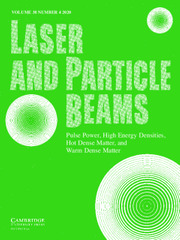Article contents
Scaling stellar jets to the laboratory: The power of simulations
Published online by Cambridge University Press: 08 December 2009
Abstract
Advances in laser and Z-pinch technology, coupled with the development of plasma diagnostics, and the availability of high-performance computers, have recently stimulated the growth of high-energy density laboratory astrophysics. In particular, a number of experiments have been designed to study radiative shocks and jets with the aim of shedding new light on physical processes linked to the ejection and accretion of mass by newly born stars. Although general scaling laws are powerful tools to link laboratory experiments with astrophysical plasmas, the phenomena modeled are often too complicated for simple scaling to remain relevant. Nevertheless, the experiments can still give important insights into the physics of astrophysical systems and can be used to provide the basic experimental validation of numerical simulations in regimes of interest to astrophysics. We will illustrate the possible links between laboratory experiments, numerical simulations, and astrophysics in the context of stellar jets. First we will discuss the propagation of stellar jets in a cross-moving interstellar medium and the scaling to Z-pinch produced jets. Our second example focuses on slab-jets produced at the Prague Asterix Laser System laser installation and their practical applications to astrophysics. Finally, we illustrate the limitations of scaling for radiative shocks, which are found at the head of the most rapid stellar jets.
- Type
- Research Article
- Information
- Copyright
- Copyright © Cambridge University Press 2009
References
REFERENCES
- 9
- Cited by


